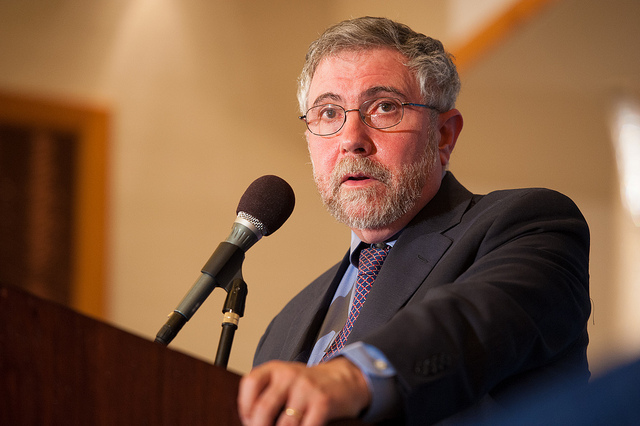The budget pain facing California this year is not California’s fault, said Paul Krugman, the Nobel Prize-winning economist who has been among the most outspoken writers critiquing the government’s response to what he calls an economic “depression.”
The state budget Gov. Jerry Brown signed Wednesday at least on the surface bridges a $15.7 billion potential deficit — by far the highest shortfall faced by any state this year. As tax revenues continued to fall below expectations in a suffering economy, California state and municipal governments continue to slash spending. The state’s $91.3 billion budget represents the lowest state spending level since 1999.
“Gov. Brown faces political constraints that, if anything, are even worse than those faced by President Obama, because of the craziness of California’s constitutional setup,” Krugman said at a recent appearance at the Commonwealth Club of California. He said Proposition 13, the state’s requirement of a legislative supermajority to pass tax increases, was the main culprit.
More than tax hikes are needed to help ailing states, he said. Federal aid to state and municipal governments to rehire workers is paramount to ending the crisis.
Across California, 44,300 government positions have been lost in the past year, and since the May 2008 peak in government employment the state has lost 155,000 public-sector employees. The new budget largely preserves public employees’ jobs but relies on more than $9 billion in increased tax revenue will be before the voters in the fall.
Even in San Francisco, which has recently seen a large rebound in private-sector hiring, a loss of 2,000 government positions in the past year has created a drag on the local economy and taken away stable middle-class jobs.
Krugman’s solution is Keynesian, relying on massive public investment to pull state and local governments out of their fiscal holes. “I would put the number at 300 billion dollars a year of aid,” said Krugman, who is an economic professor at Princeton and a New York Times columnist, who is on a national tour to hawk his book, “End This Depression Now.”
“It should be open-ended,” he said. “It shouldn’t have a definite expiration date, because the right time to end it is when the economy is recovered and does not need it anymore.”
Nationally the shortfall in state budgets since the beginning of the economic crisis has been more than half a billion dollars, largely due to municipal shortfalls. Continuing cuts in state and local budgets across the country continue to be a drag on the economy, and even reduce private-sector job creation that otherwise would be expected.
According to the Center on Budget and Policy Priorities, revenue growth probably won’t come close to what states need to restore the programs that they cut during the recession — until 2019. Unless states raise taxes, at least temporarily, or receive additional federal aid while the economy slowly recovers, states will continue to face steep shortfalls and hard choices.
Krugman said these trends argue in favor of a policy reversal: “What we have actual been doing is the reverse of stimulus. What we actual have been doing is cutting back. Normally state and local government work grows roughly with population. We should have added 700,000 jobs in state and local government just keeping up. In fact, we laid off 600,000, so right there we are 1.3 million jobs down from where we should have been in the public sector.”
Earlier this month, the Obama administration began to press for additional federal money to help the most numerous of all government workers — public school teachers. Obama used his June 9 weekly address to push for federal action to start rehiring the 250,000 public school teachers lost during the crisis.
More than 40,000 educators have been laid off in California since 2008 and teacher layoffs are expected to continue in the coming year.
“It should concern everyone that right now — all across America — tens of thousands of teachers are getting laid off,” Obama said. “I realize that every governor is dealing with limited resources and many face stark choices when it comes to their budgets. But that doesn’t mean we should just stand by and do nothing. When states struggle, it’s up to Congress to step in and help out.”
But with a recalcitrant Congress, and a looming presidential election, it is unclear if new federal relief for states can be addressed this year.
“It sounds wise and sophisticated and serious to stroke your chin and say there are no quick fixes,” Krugman said at his mid-June San Francisco appearance. “But that’s all wrong. There are quick fixes. This is a moral issue. What’s happening now is not just bad management, not just something we should be doing better. What’s happening is terrible.”










